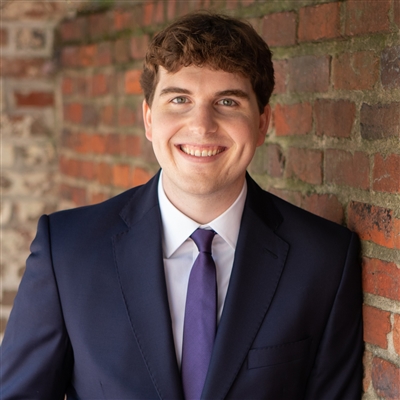Treston Chandler

Class Year:
2016
Job Title:
Senior Research Associate, Wisconsin Project on Nuclear Arms Control
Areas of Study:
History, Politics
Hometown:
Chicago and Cairo, Egypt
What made you decide to become a History major at Lake Forest College?
I became increasingly interested in history during the second half of high school, particularly during my AP US history class. My FIYS class at Lake Forest was “Lincoln’s America, America’s Lincoln,” during which I fell in love with the study of history. I remember discussing my FIYS summer paper, which analyzed various autobiographical statements written by Abraham Lincoln, with my professor and knowing that I wanted to continue doing that. I realized that I would not only gain valuable life and career skills studying history, but that I would get to engage in stimulating intellectual pursuits as well.
Is there a specific memory that sticks out to you from your time as a history student?
Some of my fondest memories from my time at Lake Forest are from two seminars I took with Professor Anna Trumbore Jones on Roman and Medieval Christianity and the European Reformations. The classes were centered around discussions of various primary and secondary texts exploring key theological questions, many of which are still relevant today. I looked forward to these classes and the phenomenal discussions we had in them. I wish I could still take them today!
What is something students considering majoring in History should know?
I understand why students are hesitant to major in history given the “What can you do for me now?” work culture present today, but I believe that a history major is the perfect balance between pursuing one’s intellectual curiosities and gaining practical, applicable job skills. In my experience, employers want to hire well-rounded and articulate individuals who are able to convey interest in, and knowledge of, the world around us. History majors are taught a particular way of thinking that naturally lends to such an ability. I also encourage students to combine a
history major with another major outside the field and allow the two degrees to complement each other.
Don’t be discouraged from majoring in history because people tell you history majors are not employable. They most certainly are! I encourage students to worry less about the skills one may be gaining and focus more on the learning and the process. In my experience, students will find that if they focus on doing their best and learning as much as possible, they will suddenly discover they have a vast array of valuable skills they never knew they had.
Why is History relevant and important today?
Our understanding of the past directly influences our perceptions of the present. In order to address the key social and political issues we face today, we as a society need to recognize how what happened in the past continues to affect our reality today, and our policies need to reflect that history. Studying history allows us to better understand the present, which allows us to better address the issues we face.
What are you up to now? In what ways did being a history major help you after graduation?
I am a senior research associate at the Wisconsin Project on Nuclear Arms Control, a small research organization based in Washington, DC, that works to counter the proliferation of nuclear weapons and their delivery systems by profiling the companies and individuals involved in proliferation-related transactions. On a daily basis I engage in extensive open-source research on various companies and individuals—essentially learning everything I can about these entities in order to write miniature histories of them. I scour the Internet, government and international organization publications, trade data, corporate registries, printed materials, and anything else I can get my hands on to gain the most complete picture possible of a particular entity. I then determine what is relevant to include in the profile and write a concise summary of what I have found. These profiles are used by governments and corporations around the world to screen transactions and shipments to ensure no suspicious parties are involved.
Every day I rely on skills I gained as a history major. One of the most important skills I learned at Lake Forest was how to evaluate sources and consider the reliability of information the sources present. I often come across sources that present conflicting information, and I have to determine which source to use or whether I should discard both sources as unreliable. Another useful skill I learned at Lake Forest is the ability to take large amounts of information and produce concise summaries of it. I recall an assignment that involved summarizing a fifty-page article in less than 250 words. Most of the entity profiles I write are about that length and sometimes come from a similar amount of information, so I regularly employ that skill. I also still follow the same general research and writing process when drafting entity profiles that I used when writing history papers at Lake Forest.
Finally, footnotes are your friends—embrace them, enjoy them, learn to live and breathe them! My experience with footnotes in college has certainly helped me in my current position.

